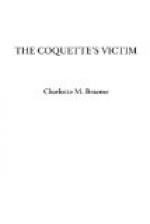In the meantime, the two gentlemen advanced slowly up the room. They, too, paused before “The Coquette’s Decision,” and laughed. Then one, leaving his companion, came hastily to the seat where Lady Amelie was sitting. He held out his hand as though surprised and delighted.
“Lady Amelie!” he said. “I felt sure that I was not mistaken—that it must be you.”
There was no answering delight on her face; nothing but constraint, embarrassment and confusion.
“How do you do, Count Jules?” she said, coldly. “This is an unexpected surprise. I thought you had left London for some years.”
“L’homme propose, Dieu dispose,” said the count. “I only reached England last night, and have hurried to London.”
“It is strange that I should meet you here,” she said.
“My friend, Monsieur Le Blanc, has a picture here, and I have been criticising it for him.”
Then Lady Amelie seemed to remember the laws of politeness, for she introduced the two gentlemen, who looked very unpleasantly at each other.
Basil did not like the count, although at first sight he was certainly a very handsome man, essentially French, with a quick, shrewd, handsome face and dark hair, eyes black as night, yet bright and eloquent. It was those very eyes that Basil disliked; they were not clear, true nor honest. In fact, a sudden hatred to the French count sprang up in his heart, he could not tell how or why. They exchanged a few words, and then, under pretense of drawing Lady Amelie’s attention to a picture, Count Jules said to her:
“Can you not dismiss your young cavalier? I have come to London on purpose to see you—I must speak to you.”
“I cannot dismiss him,” she said, curtly. “He is not a footman to be sent away at my pleasure. Tell me in few words what you want.”
“I want money!” he said, with a very dark frown; “and money, Amelie, I must have.”
“I can give you none—you have no conscience. How much have you had already?”
“I have kept no account.” he replied; “and really what I have had is not of the least consequence—it is what I have to get.”
“That will be nothing from me,” she replied. “I gave you a thousand pounds three months ago, and you promised you would ask for no more.”
“I did not foresee the present necessity,” he said. “Amelie, I must have money.”
“Count Jules,” said Lady Lisle, “you are a villain, who trades upon a woman’s fears!”
“My charming lady shall call me anything she will, but I must have the money.”
“I tell you,” she replied, angrily, “that I have not got it, nor is it any use asking my lord for it; he was angry the last time, and I shall ask him no more.”
“Then get it from some other source.”
“There is no other source open to me,” she replied.
The count’s face darkened angrily.
“There need not be so many words about it, Lady Lisle. I must have the money.”




